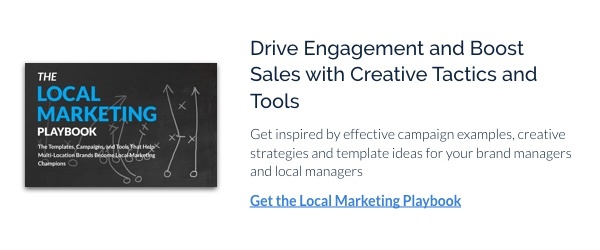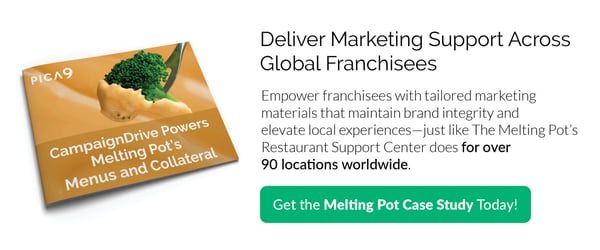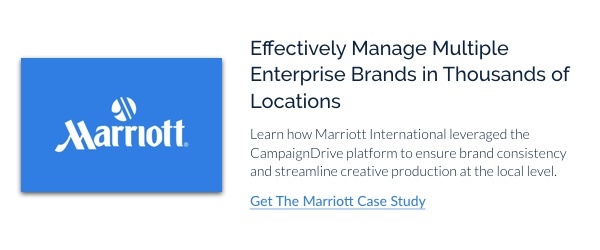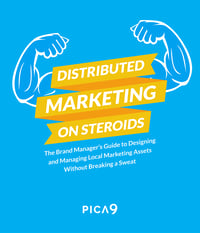CMOs and marketing leaders at distributed brands have good reason to feel confident about the future. In 2017 more than ever, these marketers have chosen to lay a marketing technology foundation that should support their brands for years to come.
Putting applications in place that will help brands to scale has been one thing that marketers across industries have focused on. Choosing the right types of technology can solve many common challenges in the distributed business model, where a corporate marketing function supports on-the-ground advertising across a large network of franchisees, dealerships or storefronts. Investing in Local Marketing Automation (LMA) has allowed the world’s most successful multi-location enterprises to deliver a consistent customer experience, boost operational efficiency and empower local marketers.
7 out of 10 distributed enterprises believe their franchise or dealer network will at least triple by 2022. This sentiment isn’t unfounded, and it’s in fact supported by International Franchise Association data that reveals franchise business growth is outpacing U.S. economic growth by 20 percent. [1]
Distributed brands are well positioned to capture today’s customers' desire for authentic, local shopping experiences. When given a choice, 90 percent of U.S. consumers prefer to spend their money at locally-owned businesses instead of corporations. [2] Multi-location marketing gives brands the best platform to capture the middle ground between the efficiency of corporate and the personal touch of local business.
Distributed brands that can overcome barriers to deliver customer experiences that are localized and consistent are positioned for growth in the years to come. There’s evidence that technology really may be key – industry leading enterprise brands who exceed annual revenue targets are 15 times more likely than average firms to invest in Software-as-a-Service (SaaS) Local Marketing Automation (LMA) tools. Today, you’ll learn six reasons why SaaS LMA is a common area of investment for distributed enterprises.
Understanding Local Marketing Automation & the Distributed Enterprise
Enterprise brands are typically understood as those that generate at least $500 million in annual revenues. Their local marketer networks may be national or global, consisting of anything from hundreds to even tens of thousands of local outlets.
Local Marketing Automation Software is technology designed to enable multi-location brands to execute consistent and scalable local marketing. LMA includes tools like local marketing templates and integrations to email service providers (ESPs), online advertising tools and web-to-print interfaces. LMA is designed to act as an all-in-one solution for local marketing execution.
While the idea of Local Marketing Automation technology can encompass both legacy applications that are hosted on-premises and Software-as-a-Service (SaaS) cloud applications, the focus of this article is on the trend of distributed enterprise brands investing in SaaS LMA.
6 Reasons Distributed Enterprises are Investing in SaaS Local Marketing Automation
In 2017, 95 percent of distributed enterprises are using marketing automation technology in some form. While adoption of automation is near-universal in the marketing department, this stat doesn’t reveal the fact that for many brands, existing automation technologies aren’t sufficient for 2017 marketing challenges and goals. Some brands are using in-house, custom legacy marketing applications that are outdated or difficult to scale. Others are using general-purpose marketing tools that aren’t designed for the distributed enterprise operating model. While many brands opting for SaaS LMA aren’t entirely new to the concept of automation, here are some key incentives for making the switch:
1. Improved Local Customer Experiences
Brand consistency is the secret to attracting and retaining happy customers. Distributed enterprises are faced with the challenging of balancing authentic local experiences with consistent delivery of the brand experience – while the Melting Pot restaurant in Tampa may offer a different wine list than the Melting Pot in Nashville, both locations need to offer a dining experience that’s authentic to the brand’s international values.
LMA presents an opportunity to centralize technology and communications at the local level. By switching away from disparate and redundant technologies, brands are able to achieve the oversight necessary to reduce the poor customer experiences that come from inconsistent in-store advertising.
2. Operational Efficiency
Achieving operational efficiency enables distributed brand marketers to scale their resources across a growing network of local affiliates. LMA tools have always been able to reduce the number of one-off design requests that come from local affiliates, while improving the quality of customized local advertising.
But with a SaaS application there are operational efficiency benefits that just can't come from custom-built tools. This is in part because SaaS LMA is much faster to implement than an in-house application. Instead of having to wait months or years for the right software features to be developed, brands can win 100% adoption in just 90 days with the right approach to implementation.
3. Superior Scalability
Nearly half (45 percent) of companies that have purchased a SaaS LMA subscription are replacing an existing tool that was custom-designed by an IT team. An additional 80 percent of the distributed brands who are still using a custom local marketing system plan to replace it with SaaS LMA in the future. While these organizations may have invested hundreds of thousands of dollars into their custom applications, it’s now become clear that "legacy" tools like these just aren't scaling to meet the brand’s changing needs.
SaaS LMA is maintained and updated by a third-party vendor, which means ongoing development and maintenance costs aren't cropping up at unexpected times and don't affect the monthly price at all. Brands have faster access to new features and the cost flexibility to purchase additional bandwidth for new franchisees or dealers on a per-user basis. For brands with aggressive growth plans, SaaS LMA tools offer the best, most efficient path to support whatever scale they need to achieve.
4. Tool Consolidation
Seventy-one percent (71%) of organizations believe getting corporate and local marketers to use the same tools is critical to delivering the best customer experience possible. The use of redundant and niche tools is often common at distributed enterprise brands that haven't launched an LMA tool. This can be a serious barrier to brand consistency and operational efficiency.
Not only do redundant technologies mean that you're paying twice the costs (both at the corporate and local levels), it makes it more difficult for the headquarters team to monitor local marketing efforts and verify both quality and performance.
Designed to act as an all-in-one solution for local marketing execution, LMA often means that local marketers won't need to invest in separate technologies for graphic design and marketing asset customization.
This of course dramatically reduces the confusion that occurs naturally when local marketing efforts are distributed across a dozen different MarTech apps. Brands are choosing to invest in SaaS LMA with the belief that tool consolidation is going to remain a key part of moving towards that consistent local customer experience that everyone wants.
5. Lack of Local MarTech Expertise
The most common problem that marketing executives report about their local marketing is that they see a lack of expertise at the local level, across many different areas. 81 percent say that because local franchisees or dealers don't have experience with marketing, graphic design and technology their brands struggle to consistently deliver excellent local execution.
The challenge extends beyond key marketing concepts and practices and into the arena of technology, where often local affiliates aren't as up to speed with tech trends as all the digital natives at corporate.
Because of this skills gap that local marketers have, Local Marketing Automation tools have to make it easy for them to be effective with the ones they do use. SaaS LMA tools are designed to make it easy for local marketers to succeed, even if they lack the background in marketing or expertise in graphic design that their colleagues at HQ have.
By offering templates that can be easily customized and approval workflows that help to correct mistakes, local marketers can add contact information or local sales details in a point-and-click environment that’s locked to protect the integrity of the design. No IT certificates required.
6. Print Customization Features
While digital is a major channel for communications between brands and customers, print is still an integral part of local marketing. Dealers and franchisees still rely every day on in-store signage, table toppers, rack cards, and out-of-home (OOH) advertising to capture the attention of local customers. Research reveals that one of the most desired capabilities for brands investing in SaaS LMA is dynamic print templates, defined as print templates that enable locals to personalize print materials for local audiences. 95 percent of brands cite print templating as a key feature they hope to gain by making the switch to SaaS LMA.
To learn more, check out How to Use Local Marketing Automation to Create Personalized Print Campaigns.
Making the Switch to SaaS LMA
For distributed enterprise brands, there are diverse benefits from making the switch to SaaS LMA. In addition to superior operational efficiency and access to tool consolidation, Marketing SaaS tools enable headquarters marketing teams to reduce dependance on IT and ensure global access from any device to their local marketing affiliates.
As CMOs at multi-location brands pursue aggressive five-year growth plans, SaaS LMA can be a tool to ensure excellence in local marketing and solve many key challenges associated with the distributed business model.
Enable your local marketers with the strategies and tools to deliver an effective marketing campaign. Download The Local Marketing Playbook: The Templates, Campaigns and Tools That Help Multi-Location Brands Become Local Marketing Champions. 
Sources:
- https://www.franchise.org/franchise-businesses-continue-to-grow-faster-than-rest-of-us-economy
- http://www.coxblue.com/cox_business_consumer_pulse_small_business_survey_2016/


